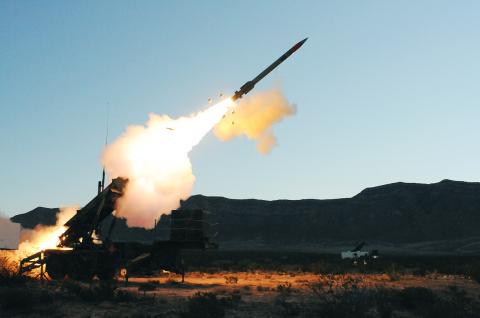After years of planning, work will officially begin early next month at sites around Greater Taichung and Greater Kaohsiung in preparation for the deployment of Patriot Advanced Capability-3 (PAC-3) air defense units purchased from the US, senior officials said yesterday.
In all, NT$61.4 million (US$2 million) has been set aside from next year’s budget to prepare the sites for four PAC-3 units in the two special municipalities. A private contractor will oversee work at the sites, a Ministry of National Defense spokesman said, declined to provide further information on the engineering contract, citing Government Procurement Act (政府採購法) regulations.
Taiwan currently deploys three PAC-2 units, which were recently upgraded to PAC-3 configuration, around Taipei in Wanli (萬里), Nangang (南港) and Sindian (新店). During negotiations under Chen Shui-bian’s (陳水扁) administration, it was decided that Taichung and Kaohsiung would both get Patriot units to protect the political and military centers, as well as critical infrastructure in central and southern parts of the country.

Photo courtesy of Lockheed Martin Corp
The ministry has reportedly mapped out a number of locations for the deployment of the PAC-3 units, including Greater Taichung’s Dadu Mountain (大肚山), Greater Kaohsiung’s Jenwu District (仁武), Greater Tainan’s Hutoupi (虎頭埤), as well as the Pingtung and Chiayi airports.
A military official would not confirm the sites chosen for the four units, which were included in the US$6.4 billion arms package notified to US Congress in October 2008 and are scheduled for delivery in 2014 or 2015. Two more units were part of a subsequent package announced in January 2010 and will be introduced as part of a future phase.
Raytheon Corp is the manufacturer of the fire units and radars, with Lockheed Martin Co producing the hit-to-kill missiles.
Taiwan has so far purchased a total of 388 PAC-3 missiles as part of the multibillion-dollar procurement deals. To increase the chances of intercept, PAC-3 doctrine calls for the use of two missiles per incoming target, a method known as “ripple firing.”
Although critics of the PAC-3 argue that the air defense system could easily be overwhelmed by a large number of Chinese ballistic missiles fired simultaneously or in close sequence, proponents of the system counter that from the beginning, the program was meant to deny Beijing the ability to engage in coercion by threatening limited missile attacks against key infrastructure to intimidate decisionmakers in Taipei.

Intelligence agents have recorded 510,000 instances of “controversial information” being spread online by the Chinese Communist Party (CCP) so far this year, the National Security Bureau (NSB) said in a report yesterday, as it warned of artificial intelligence (AI) being employed to generate destabilizing misinformation. The bureau submitted a written report to the Legislative Yuan in preparation for National Security Bureau Director-General Tsai Ming-yen’s (蔡明彥) appearance before the Foreign Affairs and National Defense Committee today. The CCP has been using cognitive warfare to divide Taiwanese society by commenting on controversial issues such as Taiwan Semiconductor Manufacturing Co’s (TSMC, 台積電) investments in the

HELPING HAND: The steering committee of the National Stabilization Fund is expected to hold a meeting to discuss how and when to utilize the fund to help buffer the sell-off The TAIEX plunged 2,065.87 points, or 9.7 percent, to close at 19,232.35 yesterday, the highest single-day percentage loss on record, as investors braced for US President Donald Trump’s tariffs after an extended holiday weekend. Amid the pessimistic atmosphere, 945 listed companies led by large-cap stocks — including Taiwan Semiconductor Manufacturing Co (TSMC, 台積電), Hon Hai Precision Industry Co (鴻海精密) and Largan Precision Co (大立光) — fell by the daily maximum of 10 percent at the close, Taiwan Stock Exchange data showed. The number of listed companies ending limit-down set a new record, the exchange said. The TAIEX plunged by daily maxiumu in just

INVESTIGATION: The case is the latest instance of a DPP figure being implicated in an espionage network accused of allegedly leaking information to Chinese intelligence Democratic Progressive Party (DPP) member Ho Jen-chieh (何仁傑) was detained and held incommunicado yesterday on suspicion of spying for China during his tenure as assistant to then-minister of foreign affairs Joseph Wu (吳釗燮). The Taipei District Prosecutors’ Office said Ho was implicated during its investigation into alleged spying activities by former Presidential Office consultant Wu Shang-yu (吳尚雨). Prosecutors said there is reason to believe Ho breached the National Security Act (國家安全法) by leaking classified Ministry of Foreign Affairs information to Chinese intelligence. Following interrogation, prosecutors petitioned the Taipei District Court to detain Ho, citing concerns over potential collusion or tampering of evidence. The

‘COMPREHENSIVE PLAN’: Lin Chia-lung said that the government was ready to talk about a variety of issues, including investment in and purchases from the US The National Stabilization Fund (NSF) yesterday announced that it would step in to staunch stock market losses for the ninth time in the nation’s history. An NSF board meeting, originally scheduled for Monday next week, was moved to yesterday after stocks plummeted in the wake of US President Donald Trump’s announcement of 32 percent tariffs on Taiwan on Wednesday last week. Board members voted to support the stock market with the NT$500 billion (US$15.15 billion) fund, with injections of funds to begin as soon as today. The NSF in 2000 injected NT$120 billion to stabilize stocks, the most ever. The lowest amount it